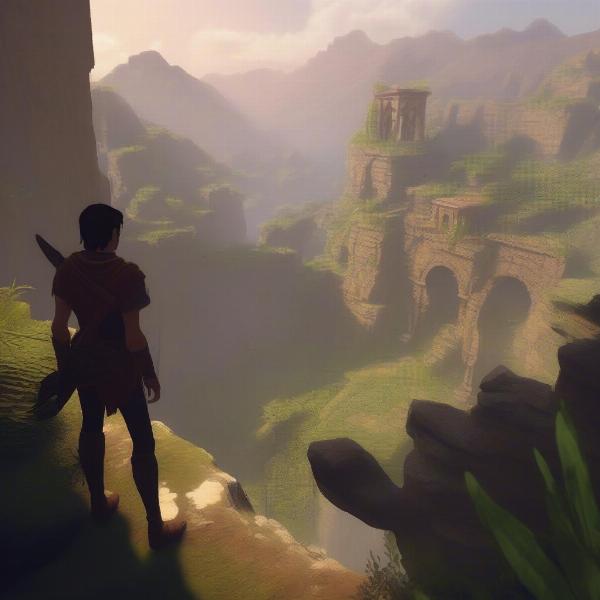A great game, simply put, is more than just entertainment. It’s an experience. It’s a journey. It’s a world you can lose yourself in, a challenge to overcome, a story to unfold. But what truly elevates a game from good to great? That’s what we’ll explore in this deep dive into the elements of a truly exceptional gaming experience.
Similar to how we discuss uninstalling games, understanding what makes a game truly great requires looking beyond the surface. A great game isn’t defined solely by its graphics or mechanics, though those are certainly important. It’s the culmination of several factors working in harmony to create something truly special. A truly great game resonates with you long after you’ve put down the controller. It stays with you, prompting reflection and discussion. It inspires you, pushes you, and maybe even changes you.
Key Elements of a Great Game
A multitude of elements contribute to a game’s greatness. Let’s break down some of the most crucial:
- Engaging Gameplay: At its core, a great game must be fun to play. Whether it’s the tight controls of a platformer, the strategic depth of a grand strategy game, or the immersive exploration of an open world, the gameplay loop should be satisfying and keep you coming back for more. A great game makes you want to play, not just feel obligated to.
- Compelling Narrative: A powerful story can transform a good game into a great one. A compelling narrative draws you into the game’s world, making you care about the characters and their fates. It provides context for your actions, giving them meaning and weight. This narrative doesn’t necessarily need to be complex, but it should be engaging and well-executed.
- Immersive World: The world a game creates is crucial to the overall experience. A great game transports you to another place, making you feel like you’re truly there. This can be achieved through stunning visuals, detailed environments, and believable characters.
- Meaningful Choices: Giving players agency over the story and gameplay is a hallmark of a great game. Meaningful choices, ones that have real consequences and impact the narrative, create a sense of ownership and investment in the game’s world.
 Immersive World in a Great Game
Immersive World in a Great Game
What Makes a Game Stand Out?
Beyond the core elements, certain qualities elevate a game to greatness:
- Innovation: Great games often push the boundaries of what’s possible, introducing new mechanics, genres, or storytelling techniques. They challenge conventions and offer fresh perspectives. Innovation isn’t about reinventing the wheel; it’s about refining it, making it smoother, faster, and more engaging.
- Emotional Impact: Truly great games evoke strong emotions. They make you laugh, cry, think, and feel. These emotional connections deepen your investment in the game and create lasting memories.
- Replayability: A great game keeps you coming back for more, even after you’ve completed the main story. This can be achieved through multiple endings, hidden content, or simply the sheer joy of experiencing the gameplay again.
“A truly great game isn’t just a product; it’s a piece of art,” says renowned game designer Anya Sharma. “It’s a collaborative effort, a fusion of creativity, technology, and passion.”
 Meaningful Choices Impacting Gameplay
Meaningful Choices Impacting Gameplay
The Subjective Nature of Greatness
While certain objective qualities contribute to a game’s overall quality, the concept of a “great game” is ultimately subjective. What one person finds captivating, another might find tedious. Personal preferences, past experiences, and individual tastes all play a role in how we perceive and appreciate games.
For example, someone might find deep enjoyment in the complex systems of a grand strategy game, while another might prefer the fast-paced action of a first-person shooter. Both experiences can be equally valid and enjoyable.
“Ultimately,” adds Ms. Sharma, “a great game is one that resonates with you personally, one that leaves a lasting impression and sparks your imagination.”
To enhance your gaming experience, understanding how to find what works for you is essential, just as knowing how to watch your favorite team play or uninstall unwanted games can streamline your entertainment choices.
 Emotional Impact in Gaming
Emotional Impact in Gaming
The Future of Great Games
As technology continues to advance, the possibilities for creating truly immersive and engaging gaming experiences are endless. Virtual reality, augmented reality, and cloud gaming are just a few of the innovations that are shaping the future of the industry. What will constitute a “great game” in the years to come remains to be seen, but one thing is certain: the pursuit of creating truly exceptional gaming experiences will continue.
The future of gaming is bright, full of potential for innovation and emotional connection. Just as figuring out how to watch your team or uninstalling an unwanted game can be straightforward, the path to finding a great game is often a journey of discovery.
Conclusion
What Is A Great Game? It’s a complex question with no single answer. It’s a blend of engaging gameplay, compelling narrative, immersive world-building, meaningful choices, and a touch of magic. It’s a subjective experience, personal and unique to each player. But above all, a great game is one that stays with you long after the credits roll. It’s an experience that transcends entertainment, becoming something truly special. Now, go out there and discover your next great gaming adventure!
It’s similar to the logic behind figuring out when certain game features are going away – staying informed keeps you ahead of the curve. For more on this, check out our article on when are logic games going away. Knowing what makes a game “great” helps you make informed choices and find experiences that truly resonate with you. So, what are you waiting for? Dive in and explore the vast and ever-evolving world of gaming!
FAQ
- What makes a game replayable? Replayability comes from factors like multiple endings, hidden content, or simply enjoyable core gameplay mechanics.
- How important are graphics to a great game? While good graphics can enhance immersion, they aren’t the sole determinant of a game’s greatness.
- Can a game with a simple story still be great? Absolutely! A simple story, executed well, can be just as impactful as a complex narrative. Similar to finding out what radio station a game is on, sometimes the simplest solutions are the best. You can find out more about this in our article what radio station is the osu football game on.
- Is innovation essential for a game to be considered great? While innovation can certainly elevate a game, it’s not strictly necessary. Classic games often remain “great” despite their age.
- How can I find games that I’ll consider great? Explore different genres, read reviews, and talk to other gamers. Knowing the game time, as discussed in our article on what time is the florida state clemson game, can be as crucial as knowing the game itself.
- Does a great game have to be long? No, a short but impactful experience can be just as memorable as a lengthy epic. Just like uninstalling games can be a quick process, as shown in our guide on how to uninstall games from riot client, sometimes a concise experience is all you need.
- Are there objective criteria for defining a “great game”? While some objective qualities contribute, “greatness” is ultimately subjective and depends on individual preferences. For instance, the ease of access, like knowing how to watch mavs game, enhances the overall experience.

